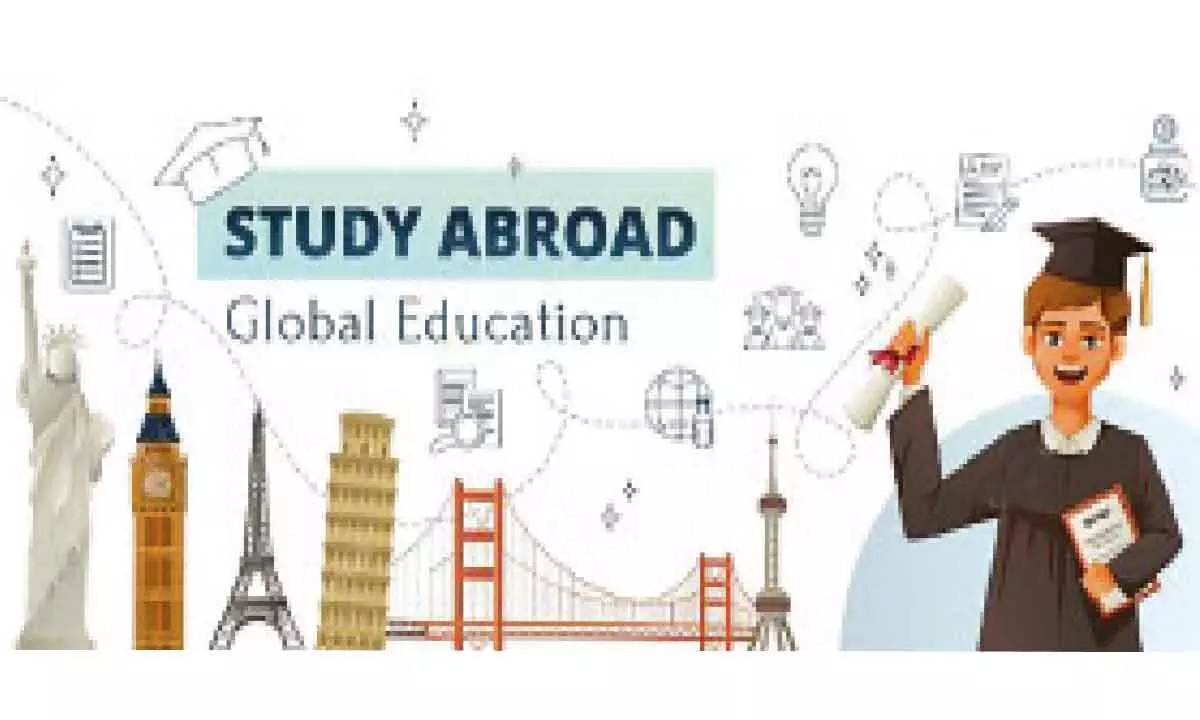Live
- Sudanese army recaptures capital of Sinnar State in central Sudan
- Kishkindha Kaandam Review: Some movies prove not to compromise in having a good cinematic experience and this is one of them
- Son-rise: Hemant Soren grows taller as tribal leader, makes father proud
- ISL 2024-25: 10-man NorthEast United FC hold on to take three points vs Punjab FC
- BGT 2024-25: Jaiswal’s application, commitment to form a partnership was so impressive, says Gilchrist
- BGT 2024-25: Personally, I am very happy with my performance, says Harshit Rana
- Pakistan's Lahore remains world's most polluted city despite light drizzle
- Asha Nautiyal retains Kedarnath for BJP, to be back as MLA after 12 years
- India leads world in science, innovation research: Minister
- Flash flood in Indonesia's South Tapanuli claims two lives
Just In
MoUs with foreign centres remain merely on paper


Parents and students are clueless about the nuances of these academic partnerships as the ground reality is different than what is told in the fine print that the students will have to cope with once landed in another country for studies. This differs from country to country
Hyderabad: Of late, the Telangana Higher Education Academic landscape has been witnessing a slew of signing the memorandums of understanding (MoUs) with foreign universities and other higher educational institutions (HEIs) from across the globe. However, parents and students are clueless about the nuances of these academic partnerships as the ground reality is different than what is told in the fine print that the students will have to cope with once landed in another country for studies. This differs from country to country.
Speaking to The Hans India, a senior faculty member from Jawaharlal Nehru Technological University, Hyderabad (JNTU-H) said, "There are success stories as well as failures where the MoUs never take off and remain only on paper." However, JNTU-H has been successful in rolling out two programmes under two different understandings reached with foreign Higher Educational Institutions (HEIs). They were signed in the United Andhra Pradesh, but the JNTU-H is successfully continuing to benefit its students.
Sharing his experience another official from Osmania University said, there was a proposal to create opportunities for the students to offer admissions and twinning/double degree programmes at HEIs in Estonia in the fields of cyber security as the country considered making it the top of the field. However, even after two years, the proposals are yet to take off. Similar is the case with the proposals discussed during a visit of a Taiwanese delegation to Hyderabadcouple of years ago. "Students can study, work and even settle was on the agenda of discussions. But, it did not materialise so far," he said.
In the case of discussions held with the officials at the Singapore National University and another technical university, "students can pursue education, and work, but cannot settle in that particular country."
Likewise, for the USA stamping a Visa is a tough stage which students have to cross. But, students who are studying either twinning/double degree programmes faced little or no trouble as it is based on a university-to-university MoU.
For a four-year bachelor's degree course, two years are studied in Telangana and the remaining two years in the HEI abroad. It works in two ways. Students can transfer their credits of study first two years to the HEI abroad and get a degree from a foreign university,or both institutions will award the degree.
But, all students enrolling on these programmes have to bear the cost of study which differs from country to country. In some countries, students have to bear insurance coverage and others offer free Medicare. It was against this backdrop that several MoUs entered earlier could not take off as they were not received well by the students.
"Our students look for assistantships, scholarships and work permits to meet the expenses of their studies after landing in another country. But, a student will have to study for a minimum period of one year to be eligible to work part-time. "There were also other issues which a student needed to negotiate. The lack of providing necessary orientation on these issues from the local HEIs is a major hurdle in many students not even taking these initiatives seriously.
Responding to these issues Telangana State Council of Higher Education (TSCHE), Chairman Prof R Limbadri said, "steps would be taken to ensure that the institutions would provide necessary orientation to the students on these issues." And, the HEIs have to issue separate admission notifications for the twinning/double degree programmes being rolled out by an HEI in Telangana along with its counterpart abroad.

© 2024 Hyderabad Media House Limited/The Hans India. All rights reserved. Powered by hocalwire.com






